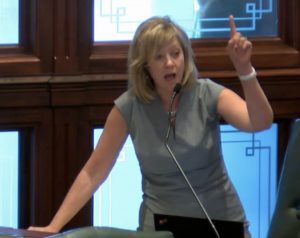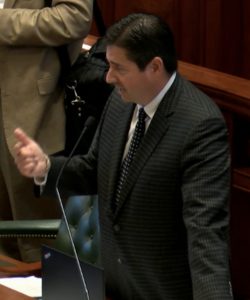State union workers finally may get back pay
By Kevin Beese Staff reporter — May 30, 2018
State Rep. Jeanne Ives (R-Wheaton) rips Democrats for not appropriating money since 2011 to cover back pay for state union employees. “Your side failed to put it into a budget and you failed to pay these workers the contractually obligated raises,” Ives told Democrats. (BlueRoomStream.com)
State employees who had their eyes on those “One Direction” T-shirts and other hot 2011 trends may soon be able to move forward with those purchases.
Illinois workers who have been owed back pay since 2011 — the state’s longest unpaid bill — may soon be getting that cash. House Bill 4290 appropriates wages earned by union employees of the state for services provided.
“I am glad that a clean bill to pay back pay has finally been given a chance on the House floor for a vote and it passed 98-10,” state Rep. C.D. Davidsmeyer (R-Jacksonsville), a co-sponsor of the legislation, said last week.
The dispute over pay began in 2011 when former Gov. Pat Quinn negotiated union contracts but the General Assembly did not fund the money for the raises. When things headed south, Quinn threatened to fire state employees and close facilities. Union leaders and Quinn negotiated a compromise that delayed, but contractually guaranteed pay raises. Quinn refused to honor the deal and the General Assembly did not appropriate funds for the pay.
Several court rulings in favor of the employees ensued, which finally triggered last week’s appropriating of $63 million by the state House.
State Rep. Jeanne Ives of Wheaton, Davidsmeyer and other Republicans put the blame for the delay in funding squarely at the feet of Democrats.
“The (House) speaker and his Democrats held one-party control of Illinois and refused to pay this court-ordered payments for five years,” Davidsmeyer said. “Then they had another two years of super-majorities in the House and Senate and refused to do anything about the state’s oldest unpaid bill.
“I have filed multiple appropriation bills to pay the back pay over the years that were never allowed to see the light on day.”
Ives said governments have to keep their promises
“When on the Wheaton City Council whatever we agreed to, we paid our union and we budgeted for it so these were negotiated for. They won these raises,” Ives said.

State Rep. Jerry Costello (D-Smithton) talks about reasons for lawmakers to support the bill he co-sponsored that would cover state union workers’ back pay from 2011. (BlueRoomStream.com)
Ives said Democrats have had control of the General Assembly — and a supermajority the past few years — and did not appropriate the back-pay money.
“Your side failed to put it into a budget and you failed to pay these workers the contractually obligated raises,” Ives said to House Democrats.
The 10 state Republicans voting against the appropriation were: Nick Batinick of Plainfield, Peter Breen of Lombard, Brad Halbrook of Shelbyville, Sheri Jesiel of Winthrop Harbor, David McSweeney of Barrington Hills, Allen Skillicorn of East Dundee, Joe Sosnowski of Rockford, Keith Wheeler of Oswego, Christine Winger of Wood Dale and Ives.
State Rep. Jerry Costello (D-Smithton), another co-sponsor of the bill, noted the long path the legislation has taken to approval.
“It’s been through the legal process. It went through arbitration and an independent arbitrator who ruled the state should pay the bill,” Costello said. “It went through the circuit court process. It went through the appellate court process and it went to the (state) Supreme Court and all three of those courts said that the state of Illinois should pay this bill. “
In 2014, lawmakers approved legislation that gave the employees 45 percent of that back pay. The pending legislation covers the remaining 55 percent, or about $63 million.
Union employees owed the back pay include workers with the Illinois Nurses Association; American Federation of State, County and Municipal Employees; Illinois Federation of Teachers; Police Benevolent Association; Laborers; and Service Employees International Union.
The legislation now moves to the Senate, which must pass it before it can be sent to the governor’s desk.
“This legislation proves that ignoring your unpaid bills does not make them go away,” Davidsmeyer said.
—- State union workers finally may get back pay —-







